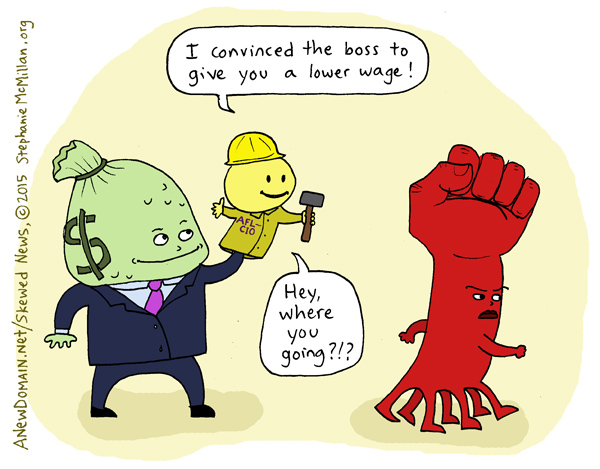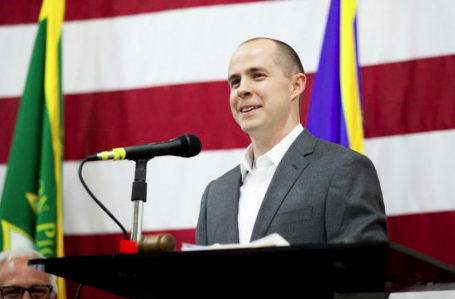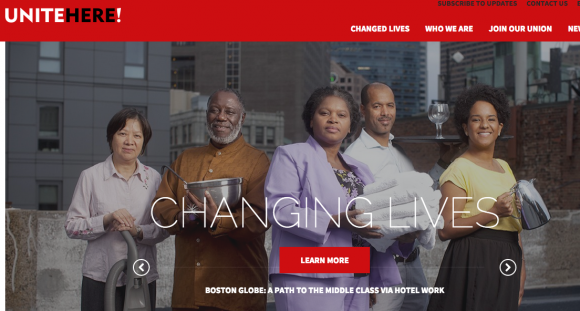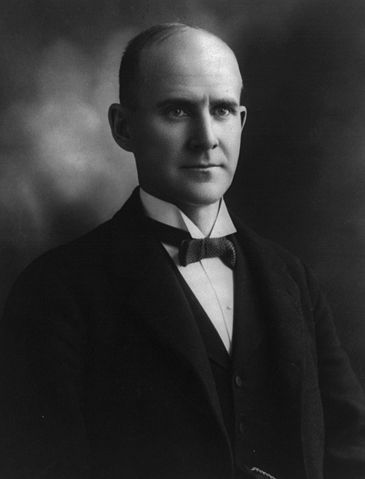aNewDomain commentary — Unions were initially organized in order to fight for the interests of their members, the workers. We can’t fight the bosses individually — we’d just get fired. We can only be effective as a collective block.
Through intense struggles, unions have historically won many concessions from the capitalist class: the end of child labor, an eight-hour day instead of a 16-hour one, and better conditions. Most important has been the fight for higher wages. That determines the conditions of workers’ lives, our ability to support ourselves and our families.
This is what unions were organized to do, what their purpose is. So what are we to think when we see the representatives of unions demanding the right for their workers to be paid lower wages than non-members? It’s crazy! It seems like the world has turned upside-down.

The executive secretary-treasurer of the Los Angeles County Federation of Labor, part of the AFL-CIO, is Rusty Hicks (pictured, below left). He has proposed that an exemption be allowed for union members not to be paid the newly passed $15 minimum wage for union members.

And he argues that Los Angeles enterprises be allowed to pay them less than other workers.
There must be rational reasons he would do that, since it’s not the time we’ve seen unions making this argument.
Whatever the reasons are, they’ve got to be self-serving.
Exemptions for union members were also included when a vote was passed last year to raise the minimum wage in San Diego. Was this opt-out clause proposed by some association of bosses and business owners and bosses, like the Chamber of Commerce? One might  assume so, because after all, bosses are known for wanting to rob workers of their rightful pay.
assume so, because after all, bosses are known for wanting to rob workers of their rightful pay.
And this wouldn’t be at all surprising. But no: As it turns out, it was proposed by someone entrusted with protecting workers’ interests: Tom Lemmon of the San Diego County Building and Construction Trades Council, AFL-CIO, pictured at right.
The AFL-CIO isn’t the only culprit.
It isn’t just the AFL-CIO. Taking advantage of union opt-out clauses in previous minimum wage legislation for some hotel employees in Los Angeles and Long Beach, Unite Here sold its own members to businesses as the “low-cost option.”

Opt-out clauses have also been part of wage legislation in San Jose, Oakland, Richmond, San Francisco, Chicago and Milwaukee. And we can expect them to be proposed more widely in the future.
Why would unions collaborate with capitalists to intensify the exploitation of their own members?
Unions attempt to justify this betrayal by saying that they need the flexibility to bargain away a portion of wages in exchange for potentially more valuable benefits. But this is a facile argument. The job of a union is not to make cowardly concessions without even a struggle. Unions are supposed to fight for higher wages AND better benefits. The operative word being “fight.”
Unions that assist and secure business interests are not worthy of the name. They should be called anti-unions.
But there are certain advantages — not for workers of course, but for the bureaucrats whose paychecks depend on them. This type of ploy may lead to the establishment of the union as a monopoly labor contractor, imposed not only on the employer, but on the employee as well. Lower paid union workers will be the obvious preference for businesses. And workers who want jobs with these companies will be forced to join. Any extra benefits the capitalist may concede aren’t likely to significantly (if at all) offset the workers’ loss of pay and payment of union dues on top of that.
It can feel awkward to criticize unions from the left, because it seems to play into the hands of capitalists, who will naturally jump at any chance to attack and discredit unions, including for this current incidence of rank hypocrisy. But our logic can’t be so simplistic that just because capitalists are against unions that we need to reflexively support them.
It’s a lot like the false argument that, if we don’t support Democrats then we’re helping Republicans. In reality, both are against us.
Anti-union capitalists will even stoop so low as to pretend to be concerned about the “freedom” of workers. But their reasons for critique are the direct opposite of ours. Capitalists hate unions because they want to dominate us even harder so they can exploit us even worse than they do already.
Capitalists even have their own organizations with the sole purpose of union busting. This fact may make us feel a reflexive need to defend unions, because currently the only evident alternative to a bad union seems to be no union, and that’s obviously not an acceptable outcome.
But why do our options have to be limited to either sell-out unions or no unions?
 Like the lesser-evil argument during elections, it’s not a real choice. There is another alternative: a genuine labor movement, run and controlled by workers. We need to construct new working class organizations that are autonomous — not run by bureaucrats, not under the leadership of capital. As we have all too painfully learned, if we don’t organize ourselves, capitalists will grind us under their boot again and again. And these collaborationist unions will help them do it.
Like the lesser-evil argument during elections, it’s not a real choice. There is another alternative: a genuine labor movement, run and controlled by workers. We need to construct new working class organizations that are autonomous — not run by bureaucrats, not under the leadership of capital. As we have all too painfully learned, if we don’t organize ourselves, capitalists will grind us under their boot again and again. And these collaborationist unions will help them do it.
Unions were formed during the country’s industrialization as effective weapons of working class struggle against capitalists.
But even then, there were fake-ass unions eager to sell workers out.
Labor leader Eugene V. Debs wrote something in 1906 that could be aptly applied today: “If the Brotherhood of Locomotive Engineers was a bona fide labor union instead of the fossilized tool of railway corporations its grand chief would be peremptorily impeached for treason to the working class.”
There is only one road to emancipation: for the working class and its most advanced detachment to reclaim our history of struggle, to take control of and lead the fight against capital.
We need to build working class organizations at all levels, including genuinely autonomous unions.
We must not allow bureaucrats and sell-outs to lead us like lambs to the slaughter; we must organize ourselves, relying on our own strength.
For aNewDomain, I’m Stephanie McMillan.
Eugene V. Debs image: “Eugene V. Debs bw photo portrait, 1897” by Unknown – This image is available from the United States Library of Congress‘s Prints and Photographs division under the digital ID cph.3a25146. This tag does not indicate the copyright status of the attached work. A normal copyright tag is still required. See Commons:Licensing for more information. Licensed under Public Domain via Wikimedia Commons.
Rusty Hicks image: via LAUnionAFLCIO.org, All Rights Reserved.
Tom Lemmon image: via San Diego Daily Transcript, All Rights Reserved.












